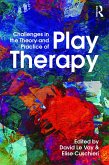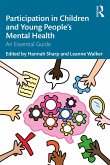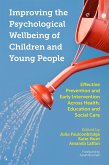Improving Communication in Mental Health Settings
Evidence-Based Recommendations from Practitioner-led Research
Herausgeber: O'Reilly, Michelle; Lester, Jessica
Improving Communication in Mental Health Settings
Evidence-Based Recommendations from Practitioner-led Research
Herausgeber: O'Reilly, Michelle; Lester, Jessica
- Broschiertes Buch
- Merkliste
- Auf die Merkliste
- Bewerten Bewerten
- Teilen
- Produkt teilen
- Produkterinnerung
- Produkterinnerung
Improving Communication in Mental Health Settings draws on empirical studies of real-world settings to demonstrate contemporary practice-based evidence, providing effective strategies for communicating with patients/clients in mental health settings.
Andere Kunden interessierten sich auch für
![Psychoanalytic Thinking in Mental Health Settings Psychoanalytic Thinking in Mental Health Settings]() Marcus EvansPsychoanalytic Thinking in Mental Health Settings39,99 €
Marcus EvansPsychoanalytic Thinking in Mental Health Settings39,99 €![Can't Talk, Want to Talk! Can't Talk, Want to Talk!]() Jo LevettCan't Talk, Want to Talk!33,99 €
Jo LevettCan't Talk, Want to Talk!33,99 €![Psychoanalysis, the NHS, and Mental Health Work Today Psychoanalysis, the NHS, and Mental Health Work Today]() Alison VaspePsychoanalysis, the NHS, and Mental Health Work Today55,99 €
Alison VaspePsychoanalysis, the NHS, and Mental Health Work Today55,99 €![Challenges in the Theory and Practice of Play Therapy Challenges in the Theory and Practice of Play Therapy]() Challenges in the Theory and Practice of Play Therapy43,99 €
Challenges in the Theory and Practice of Play Therapy43,99 €![Off the Couch Off the Couch]() Off the Couch55,99 €
Off the Couch55,99 €![Participation in Children and Young People's Mental Health Participation in Children and Young People's Mental Health]() Participation in Children and Young People's Mental Health40,99 €
Participation in Children and Young People's Mental Health40,99 €![Improving the Psychological Wellbeing of Children and Young People Improving the Psychological Wellbeing of Children and Young People]() Improving the Psychological Wellbeing of Children and Young People42,99 €
Improving the Psychological Wellbeing of Children and Young People42,99 €-
-
-
Improving Communication in Mental Health Settings draws on empirical studies of real-world settings to demonstrate contemporary practice-based evidence, providing effective strategies for communicating with patients/clients in mental health settings.
Produktdetails
- Produktdetails
- Verlag: Taylor & Francis Ltd
- Seitenzahl: 266
- Erscheinungstermin: 25. März 2021
- Englisch
- Abmessung: 234mm x 156mm x 14mm
- Gewicht: 454g
- ISBN-13: 9780367456054
- ISBN-10: 0367456052
- Artikelnr.: 60597033
- Herstellerkennzeichnung
- Libri GmbH
- Europaallee 1
- 36244 Bad Hersfeld
- gpsr@libri.de
- Verlag: Taylor & Francis Ltd
- Seitenzahl: 266
- Erscheinungstermin: 25. März 2021
- Englisch
- Abmessung: 234mm x 156mm x 14mm
- Gewicht: 454g
- ISBN-13: 9780367456054
- ISBN-10: 0367456052
- Artikelnr.: 60597033
- Herstellerkennzeichnung
- Libri GmbH
- Europaallee 1
- 36244 Bad Hersfeld
- gpsr@libri.de
Michelle O'Reilly is an associate professor of communication in mental health at the University of Leicester, UK. Jessica Nina Lester is an associate professor of inquiry methodology in the School of Education at Indiana University, Bloomington, USA.
1. Introduction: Communication, mental health, and how language-based
research can help in practice Part 1: Communication with children and
families 2. Communication in child mental health: Improving engagement with
families 3. Exploring the practical potential of discursive research in
family therapy 4. Communication in clinical psychology - using 'you said'
in interactions with children to assess for risk 5. Children's
communication and their mental health: perspectives from speech and
language therapy 6. 'Just ask': How to talk to children and young people
about self-harm and suicide risk 7. Communicating with parents about
psychotropic medication treatment Part 2: Communication with adults 8.
Deception, fantasy and confabulation: What the stories of forensic patients
with intellectual disabilities tell us about truth in therapeutic
interactions 9. Communicating about feelings: examples from depression care
10. Communication in mental health nursing - the power of the words we
choose 11. Exploring the 'talk' of suicide: using discourse-informed
approaches in exploring suicide risk Part 3: Learning Journeys 12. A PhD
learning journey - the value of conversation analysis and discourse
approaches for speech and language clinical practice. 13. Developing
supra-vision using naturally occurring video material within supervision
14. Communication in research, evaluation or audit
research can help in practice Part 1: Communication with children and
families 2. Communication in child mental health: Improving engagement with
families 3. Exploring the practical potential of discursive research in
family therapy 4. Communication in clinical psychology - using 'you said'
in interactions with children to assess for risk 5. Children's
communication and their mental health: perspectives from speech and
language therapy 6. 'Just ask': How to talk to children and young people
about self-harm and suicide risk 7. Communicating with parents about
psychotropic medication treatment Part 2: Communication with adults 8.
Deception, fantasy and confabulation: What the stories of forensic patients
with intellectual disabilities tell us about truth in therapeutic
interactions 9. Communicating about feelings: examples from depression care
10. Communication in mental health nursing - the power of the words we
choose 11. Exploring the 'talk' of suicide: using discourse-informed
approaches in exploring suicide risk Part 3: Learning Journeys 12. A PhD
learning journey - the value of conversation analysis and discourse
approaches for speech and language clinical practice. 13. Developing
supra-vision using naturally occurring video material within supervision
14. Communication in research, evaluation or audit
1. Introduction: Communication, mental health, and how language-based
research can help in practice Part 1: Communication with children and
families 2. Communication in child mental health: Improving engagement with
families 3. Exploring the practical potential of discursive research in
family therapy 4. Communication in clinical psychology - using 'you said'
in interactions with children to assess for risk 5. Children's
communication and their mental health: perspectives from speech and
language therapy 6. 'Just ask': How to talk to children and young people
about self-harm and suicide risk 7. Communicating with parents about
psychotropic medication treatment Part 2: Communication with adults 8.
Deception, fantasy and confabulation: What the stories of forensic patients
with intellectual disabilities tell us about truth in therapeutic
interactions 9. Communicating about feelings: examples from depression care
10. Communication in mental health nursing - the power of the words we
choose 11. Exploring the 'talk' of suicide: using discourse-informed
approaches in exploring suicide risk Part 3: Learning Journeys 12. A PhD
learning journey - the value of conversation analysis and discourse
approaches for speech and language clinical practice. 13. Developing
supra-vision using naturally occurring video material within supervision
14. Communication in research, evaluation or audit
research can help in practice Part 1: Communication with children and
families 2. Communication in child mental health: Improving engagement with
families 3. Exploring the practical potential of discursive research in
family therapy 4. Communication in clinical psychology - using 'you said'
in interactions with children to assess for risk 5. Children's
communication and their mental health: perspectives from speech and
language therapy 6. 'Just ask': How to talk to children and young people
about self-harm and suicide risk 7. Communicating with parents about
psychotropic medication treatment Part 2: Communication with adults 8.
Deception, fantasy and confabulation: What the stories of forensic patients
with intellectual disabilities tell us about truth in therapeutic
interactions 9. Communicating about feelings: examples from depression care
10. Communication in mental health nursing - the power of the words we
choose 11. Exploring the 'talk' of suicide: using discourse-informed
approaches in exploring suicide risk Part 3: Learning Journeys 12. A PhD
learning journey - the value of conversation analysis and discourse
approaches for speech and language clinical practice. 13. Developing
supra-vision using naturally occurring video material within supervision
14. Communication in research, evaluation or audit









